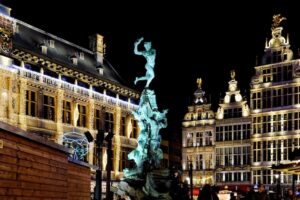Brabo and the Giant Antigonus
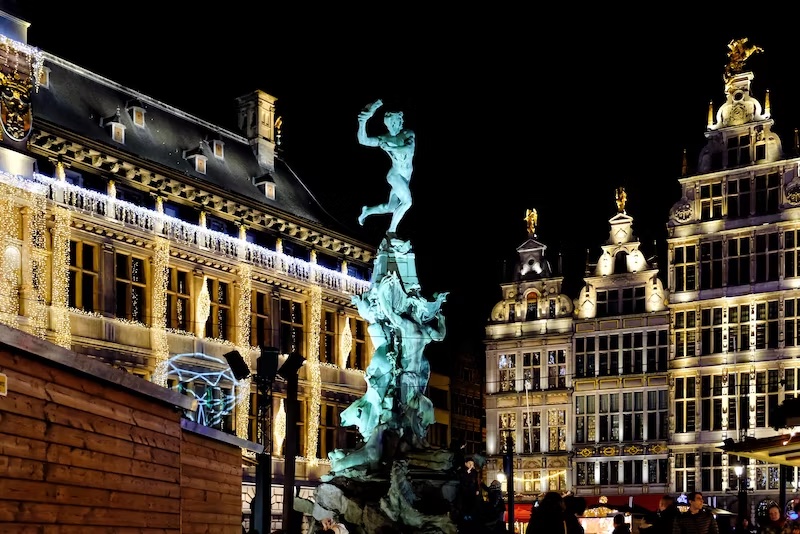

Brabo and the Giant Antigonus
Dutch Folktale Retold by Navin
It all happened in Antwerp, the largest city in Belgium…. long, long, ago. 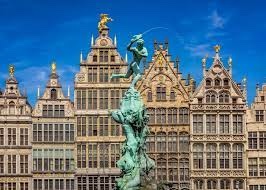 At that time there lived a giant called Antigonus in a castle on the Scheldt River. His original name was something else! But when he heard of a Greek general with that name, he took it as his own. He was a very rough and cruel giant.
At that time there lived a giant called Antigonus in a castle on the Scheldt River. His original name was something else! But when he heard of a Greek general with that name, he took it as his own. He was a very rough and cruel giant.
The Scheldt River was very broad, wide, and deep. It was a safe river with no rocks and flowed through a pretty part of the country. All the captains of the time enjoyed sailing this route. Ships loaded with iron, cheese, fish, bread, linen, timber, flax sailed out of France and Holland down this stream. This caused the region to flourish, attracting rich merchants, plentiful food, and happy days. All the children were wealthy.
The towns in the region were beautiful, looking just like cheerful, sun-dappled 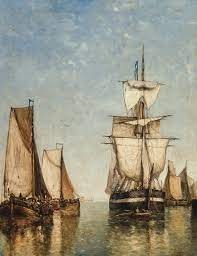 paintings by the maestros of the day. One could see hundreds of white-sailed ships from the river. The children loved to stand on the banks watching the ships sail to and from the shores. The incoming ships brought wool and tons of good things to eat. Many craftsmen travelled from the southern countries, bringing their architecture, cuisine, and culture. They helped build churches, town halls, homes, and parks. As the country flourished in all ways, everyone in Belgium was happy.
paintings by the maestros of the day. One could see hundreds of white-sailed ships from the river. The children loved to stand on the banks watching the ships sail to and from the shores. The incoming ships brought wool and tons of good things to eat. Many craftsmen travelled from the southern countries, bringing their architecture, cuisine, and culture. They helped build churches, town halls, homes, and parks. As the country flourished in all ways, everyone in Belgium was happy.
Antigonus the cruel giant could not stand seeing everyone so happy. He wanted to grow rich himself.
And so, he made his castle stronger, raising high walls and building dungeons in the deep recesses underground. He then made a club with an oak tree and strode through the town square. He asked for everyone to gather and waited impatiently as the square filled up with townspeople. He then roared, “From this day forth, no ship either up or down the river, shall pass by this place, without my permission. Every captain must pay me a heavy toll in money or goods. Whoever refuses will have his hands cut off and thrown into the river. Obey! If anyone disobeys, I will cut his thumbs and put him in the dark dungeons for a month.” He smashed a cart with his club just to show his strength.
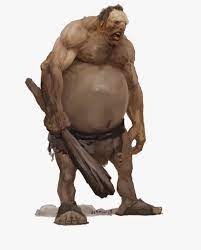 Every ship that crossed the river now had to pay heavy tolls, whether the captain was rich or poor. The captains that refused were brought ashore and presented to the horrid giant, who made good on his wicked promise.
Every ship that crossed the river now had to pay heavy tolls, whether the captain was rich or poor. The captains that refused were brought ashore and presented to the horrid giant, who made good on his wicked promise.
Soon the news spread far and wide and captains from France and Spain kept out. The merchants grew poorer as the trade dwindled without any transactions. Some people tried to silently escape the city at night. But the giant’s watchers who saw them from the castle towers caught them and they were punished and thrown into the dungeons. The city soon became poor and miserable and foreign merchants refused to come that route.
The reputation of the city grew worse and was nicknamed by the Germans as “Hand Werpen.” The Dutch called it “Antwerp,” which meant “Hand Throwing.”
There was a brave young fellow named Brabo in the province of Brabant. He was proud of his country and her flag of yellow, black, and red, and was loyal to his lord. He studied the castle well and saw a window, where he could climb up into the giant’s chamber.
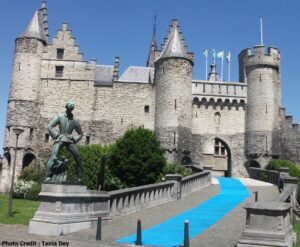 Going to the Duke, Brabo promised if his lord’s soldiers would storm the gates of the giant’s castle, that he would seek out and fight the ruffian. While the gates were battered down, he would climb the walls. “He’s nothing but a ‘bulle-wak’ (a bully and a boaster),” said Brabo, “and we ought to call him that, instead of Antigonus.”
Going to the Duke, Brabo promised if his lord’s soldiers would storm the gates of the giant’s castle, that he would seek out and fight the ruffian. While the gates were battered down, he would climb the walls. “He’s nothing but a ‘bulle-wak’ (a bully and a boaster),” said Brabo, “and we ought to call him that, instead of Antigonus.”
They laid out a clear plan. One dark night, one thousand men-at-arms marched so quietly so the watchers of the castle wouldn’t hear any sound. They reached the woods and waited till after midnight. Brabo’s comrades set up a tall ladder. He climbed into the castle window.
The men below pounded and punched the iron gates and all the tower’s watchmen  rushed to the gates. Brabo used this opportunity and slowly hopped inside with his sword. He took a torch and crept through the silent, dark castle. Finally, he made it to the giant’s own room.
rushed to the gates. Brabo used this opportunity and slowly hopped inside with his sword. He took a torch and crept through the silent, dark castle. Finally, he made it to the giant’s own room.
The giant spotted Brabo and glared at him. He swung his club and brought it down with such force that it went through the castle floor. Brabo dodged the blow and in a trice made a sweep with his sword cutting off the giant’s head. It sprung far through the window and landed on the streets.
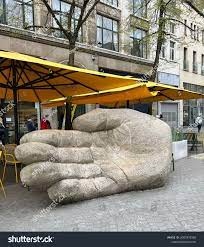 Seeing this, the watchers ran away and the men at arms were overjoyed. Brabo then cut off the giant’s hands and threw them into the river.
Seeing this, the watchers ran away and the men at arms were overjoyed. Brabo then cut off the giant’s hands and threw them into the river.
Every house in Antwerp displayed lighted candles. The entire city was illuminated. All the maidens dressed in white. The leader of the city was dressed in yellow, red, and black, the colors of the Brabant flag. All the people celebrated and sang songs in praise of Brabo.
The townsfolk were riotously happy. Some wanted to change the name of Antwerp. But the leader of the town said, “Let us rather keep the name, and, more than ever, invite all peaceful ships to come again, ‘an-‘t-werf’ (at the wharf), as of old.”
“Agreed,” cried all the citizens happily. Brabo was hailed as a hero and was richly rewarded. Thousands of ships visited Antwerp again and once again the town became very rich. The people dearly loved their city and considered Antwerp the pearl set in the world’s ring.
To this day, in the great square in Antwerp, Belgium, there is a bronze statue of Brabo and the headless, handless giant Antigonus lying sprawled. Brabo holds one of Antigonus’s hands which he is about to toss into the Scheldt River.
